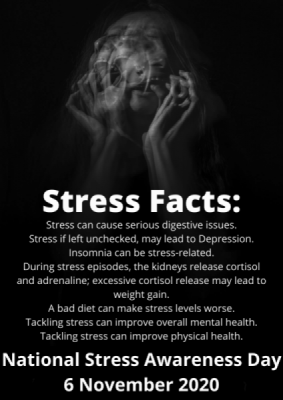National Stress Awareness Day 6 November 2020
“Life is what happens to you whilst you’re busy making other plans”
John Lennon
If this quote resonates with you then I challenge you to take a step back and consider if you’ve ever made plans to combat the stress in your life, or if you tend to ‘just get on with it’ in the hope that everything will work itself out, no matter if you find yourself suffering in the process.
Life doesn’t have to be that way unless you make that choice for it to continue as it is. Everything in life is a choice and doing nothing about your situation(s) is also a choice.
Promoters of National Stress Awareness Day consider stress to be: ‘One of the most harmful things a person can experience for both their physical and mental well-being.’ How does it feel to read that or say it out loud? Knowing that it’s harmful but not doing anything about it might now seem akin to knowing the same about say, smoking, drinking or a poor diet; we know it causes damage but it’s easier to carry on regardless because change is hard.
Is carrying on in the same vein actually easier?
If stress has no outlet or no resolution then the damage to both body and mind becomes accumulative. One of the most common sentences I hear in my practice is ‘I never used to be this way.’ There’s a good reason for that- years ago you hadn’t built up the same levels of stress that you experience now and the body and mind have a threshold. If you find yourself really struggling right now with pressures of work, family life and other circumstances then chances are that the way you attempt to manage these things is starting become a redundant mechanism that’s ultimately failing you. It may appear to be easier to carry on as you always have done but you will reach burnout- I can promise you that. And you’re right, change is scary but consider the alternatives- potential depression symptoms, anxiety symptoms, long-term fatigue, brain fog, indecision, frequent headaches, disinterest and poor performance. All of these symptoms are extremely likely and will persist if changes aren’t made to your daily routine.
How can you help yourself?
- Identify what areas of your life are causing you the highest levels of stress.
- Prioritise the most harmful areas and list them 1, 2 and 3; 1 being the first one to tackle.
- Look at your proportion of responsibility for this area: is it down to you 100% or is someone else involved?
- Consider if your coping strategies are actually working for you right now and what could be realistically changed to benefit you.
- Think about what is in your control and what is not in your control; concentrate on what you can control.
- Identify if you have legitimate and rational concerns or if you are overwhelmed and are thinking about the worst-case scenario without any evidence that will actually happen to you.
- Admit that you need help- this is the hardest one, especially if you tend to bottle things up. You coped up until this point and that is fantastic but now it’s time to reach out for support because you are no longer coping. Speak to a friend, colleague, manager, HR or a Counsellor.
Together you can make a plan to resolve the first area of stress in your life.

Add Comment